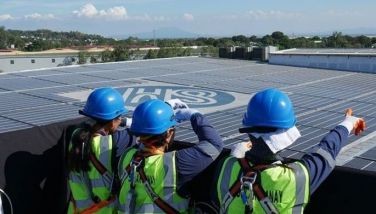CSR

Although a number of bishops have taken pig-headed positions against all forms of mining in the country, a number of clergymen assure us that there is no doctrinal basis for such a stance. In the area around Tampakan in Southern Mindanao, site of one of the largest confirmed gold and copper deposits in the world, clergymen and local leaders welcome the prospects for development presented by the mining industry.
I visited the area recently and witnessed the public expectation for development. Sagittarius Mining, which is developing the Tampakan mine, has begun employing hundreds of locals, purchasing land for its facilities and seeding new economic activities in the communities. Although mining operations will commence several years down the road, the initial investments are palpable in the local economy. In all, investments in this mine alone is expected to reach about $6 billion. When the mine begins operating, it will create trillions of pesos in new wealth for our economy.
Fr. Emeterio Barcelon, SJ describes the doctrinaire anti-mining position of some of his colleagues as “largely irrational”, deriving from some colonial mindset overcome by a false sense of smallness and fearful of anything big. In the case of modern mining technologies, the industry must either be big or it will be futile. It must use the best technology available or risk harming the environment as well as wasting much of the natural resource.
Surely, there could not be anything doctrinally wrong with mining as a development enterprise if the Church is itself invested in the industry.
Take the case of Philex, a long-established gold and copper mining conglomerate. The Roman Catholic Archbishop of Manila ranks 15th in the list of top investors in the company. The Religious of the Virgin May ranks 16th in the investor list. The Archbishop of Zamboanga is the 65th largest investor.
Under the very strict provisions of the Mining Act, all mining activities must seek the free and informed consent of the communities directly affected by a project. In addition, they are required to plan for remediation of the environment not just after the mine’s closure but through the whole course of its operation. As an operating procedure, the large mining investments hire as much from the locality as possible so that the economic benefits of the enterprise are more directly felt by the communities.
In addition, the mining companies, conscious of stereotypes of the industry and the public memory of past mining activities that where far less regulated and far less responsible than they are now, dutifully support corporate social responsibility (CSR) programs.
In the case of Philex, for instance, the company’s Social Development and Management Program invested over the last decade P8.5 million for community health services, P32.9 million for education programs, P39.5 million for community livelihood programs and P91.9 million for public infrastructure.
For its part, Sagittarius Mining is building a new power plant in Davao del Sur so that its power needs will not burden the existing generating capacity in the island. The new plant will actually generate much more power than the mining operation will need. That excess power will be fed back to the grid to benefit power-short Mindanao.
For a small, volcanic archipelago, the Philippines is a minerals powerhouse. We rank 3rd in the world for known gold deposits, 4th for copper, 5th in nickel and 6th in chromite. If we nurture responsible mining and if the mining investments properly exercise their corporate social responsibilities, the industry will be the key to our economic development.
Sub-optimal
We’re in a Catch-22 situation on the matter of taxes and spending. The new administration rather foolishly promised no new taxes during the campaign period. Tied down by that promise, it can manage the deficit only by cutting back on spending. By doing so, it compromises our economy’s ability to grow.
Desperate to raise revenues, the administration is now looking into the possibility of raising what are called “sin taxes” - those levied on such things as tobacco and alcohol products. That seems to be anchored on the assumption that these products may be taxed to the heavens without diminishing demand. That is an incorrect assumption.
Our Finance authorities ought to study the cases of Singapore and Malaysia on the matter of taxing tobacco products.
From 2002 to 2004, Singapore raised excise taxes in tobacco products and managed to raise revenues. After the 2004 increase, however, public revenues declined dramatically. To cover the shortfall, excise taxes were increased further, resulting in more revenue declines.
This happened even if smokers in the city-state increased. During the six-year period when excise taxes were raised annually, the number of smokers increased 33 percent.
Eventually, Singaporean authorities realized that the drop in excise tax collections was due to increased smuggling of tobacco products. The high excise taxes simply induced smuggling.
Malaysia had the same experience. From 2004 to 2010, Malaysia raised excise taxes on tobacco products 22 percent. Over the same period, Malaysian cigarette manufacturers purchased only half of raw tobacco leaf from the country’s farmers, resulting in economic dislocation.
In a recent study by an investment bank, it was established that Malaysia now had the highest level of contraband cigarettes. This despite Malaysia’s use of the tax stamp technology sold by Sicpa Products Security — the same stamp now being peddled to our tax authorities. The stamp merely aggravated the cost implications of higher excise taxes.
As in neighboring Singapore, Malaysia began earning much less from punitively taxing “sin” products - notwithstanding the use of expensive “product security” stamps. There is something for us to learn from the experience of our neighbors.
- Latest
- Trending


























